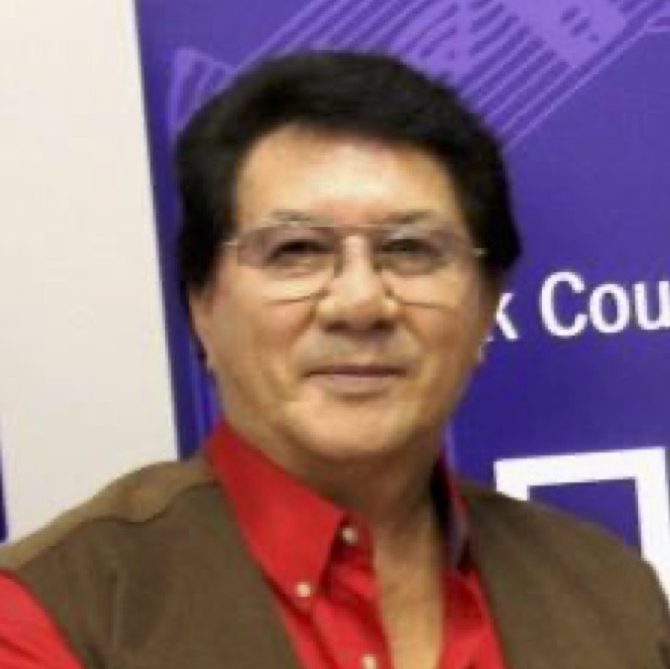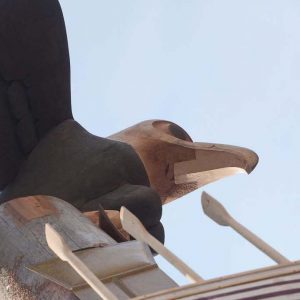Watch the recording of “You Are On Indian Land: Crossing the Borders of Truth, Reconciliation and Redress.” In this Indigenous Speaker Series session, we had a conversation with Grand Chief Mike Kanentakeron Mitchell of the Mohawks of Akwesasne, and director of You Are On Indian Land and we learnt more about the broader reach of truth, reconciliation and redress.

Join us virtually on Wednesday, March 15th, 2023 from 12:00 pm – 1:30 pm (PST), for “You Are On Indian Land: Crossing the Borders of Truth, Reconciliation and Redress” This virtual event is presented by the Indigenous Speakers Series.

Grand Chief Mike Kanentakeron Mitchell
Knowledge Keeper, Mohawk Council of Akwesasne (Bio)
Michael Kanentakeron Mitchell is one of the most respected First Nations leaders in Canada. Born in Akwesasne and raised by a traditional family, Kanentakeron had the benefit of a strong cultural and spiritual upbringing. Fluent in the Mohawk language, Kanentakeron has successfully applied traditional diplomatic skills in solving today’s challenges to First Nations on local, regional and national levels in all areas of development and renewal. For three decades, Kanentakeron served his people in a political capacity as Chief and Grand Chief in one of the most volatile, yet progressive First Nations communities in Canada. His vision to help restore the independence of the Mohawk people of Akwesasne is based on applying the best of both Hotinonshonni philosophy and modern democratic government systems.
Moderator
- Derek K Thompson – Thlaapkiituup, Indigenous Advisor
Description
You Are On Indian Land is a documentary film that was made in 1969 and it underlines many of the outstanding issues we see today in our First Nations communities. The film is powerful and unapologetic in showing the white man’s indifference against Indians. The film’s message remains true today in exposing the attitudes from those colonial and new settlers who don’t want to see First Nations assert their legitimate place in Canada. You Are On Indian Land represents the long-standing tension between those who are from here and those who have arrived here as colonial and new settlers. This important film can better inform how we think about today’s common practice of land and territorial acknowledgments, and how we think about the broader reach of truth, reconciliation and redress.
I was a kid when I first watched the film You Are On Indian Land, and it was right after watching another film called The Land Is Our Culture. The latter was produced by the Union of BC Indian Chiefs in collaboration with the National Film Board, and it was about our continuing struggle to legitimize our rights and title in this province. Even as a kid, I was moved, and I didn’t know why but what I felt was a sense of dignity and strength. From that moment on my purpose in life was created, whether I knew it or not. It’s been one of my personal missions to meet and shake the hand of Grand Chief Mike Kanentakeron Mitchell for all that he has done, and continues to do, for his people and for First Nations across this country. In 2011, I met and shook the hand of Grand Chief Kanentakeron and he toured me around his community of Akwesasne and introduced me to members of his community, and nearly the entire time I felt like I did when I was a kid – transported to a time in which I felt a strong sense of dignity and strength.
Indigenous peoples are the only segment of Canadian society that are simultaneously trying to come to terms with the past and to try and find a good way forward. Grand Chief Mike Kanentakeron Mitchell of the Mohawks of Akwesasne said that, “Our leaders of the past talked about the importance of dignity – that a leader should not only know his own worth but also to be worthy to the community. Our elders talked about the importance of language – that a leader should know the value of teaching our languages to our children in every aspect of today’s education system. The great leaders of the past talked about the urgency for all of us as First Nations and Indigenous peoples to decolonize – that to be truly independent is to rid ourselves of the continuing legacy of oppression and to assimilate ourselves in our own culture, ceremonies and languages. There is a need for today’s leaders to return back to the ways of our Ancestors – that in this era there was an absence of arrogance and a strong foundation of humility that put the wellness of the community first. The leaders in our communities must focus on working with the people – that this work must reflect the true worth of a sense of belonging, strength of culture and the values of independence.”
So, to those who are Indigenous – First Nations, you also have an important role and you are worth every effort of purpose and determination to be happy and content in the world and free from the bounds of redress, telling the truth and reconciling for the future. Your job is to learn to be resilient and to make every effort to earn your place in the world for those that sacrificed their lives having been caught up in the trappings of colonialism, racism, oppression, and assimilation. And, to those who are colonial and new settler Canadians, you have an equally important role to learn, figure out and find ways to support the processes that we’ve committed to called Truth, Reconciliation and Redress.
Topic: You Are On Indian Land: Crossing the Borders of Truth, Reconciliation and Redress
Date: Wednesday, March 15th, 2023
Time: 12:00 – 1:30 pm PST
What Will I Learn?
You will learn about the unique perspectives of how to best approach the work in relation to the processes of Truth and Reconciliation.

Continue Learning
“The time to make things happen is now. The time to seek out our individual and shared power is now.”
Learn more about REDI’s Indigenous Initiatives here
Discover more about REDI’s Indigenous Initiatives Speakers Series here
Find REDI’s Indigenous-Specific Resources here